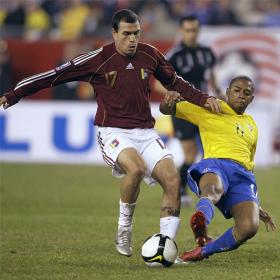 This isn’t my usual topic area for blogs, but I found the research interesting and its clearly something that is overlooked. I actually wrote the piece as part of my completion of a course with The Open University called ‘The Business of Football‘ which I would highly recommend. It’s a free course which looks into subjects such as motivating a workforce/team, power relationships and the consequences of globalisation within football. The following piece looks at the effects of globalisation on South American football, with a particular focus on Venezuela.
This isn’t my usual topic area for blogs, but I found the research interesting and its clearly something that is overlooked. I actually wrote the piece as part of my completion of a course with The Open University called ‘The Business of Football‘ which I would highly recommend. It’s a free course which looks into subjects such as motivating a workforce/team, power relationships and the consequences of globalisation within football. The following piece looks at the effects of globalisation on South American football, with a particular focus on Venezuela.
“Globalisation is the process of international integration arising from the interchange of world views, products, ideas and other aspects of culture”. Recent advances in technology, communications and transport have accelerated the rate at which organisations can globalise and utilise the vast markets available to them. In football it means that clubs can expand their market across the world in order to reach wider audiences, poach players from abroad, increase merchandising and open up greater opportunities for sponsorship. Each of these factors go a long way to explain the motives behind the actions of some of the bigger Premier League sides. Manchester United is a prime example of an organisation which has set out its strategy to break into the big markets across the globe. This link provides an insight into how they go about doing so. There are a series of paragraphs which talk about sponsorship’s, merchandising, broadcasting rights and licencing.
For the year 2012-2013, their revenue was over £100m greater than any other English club. Clearly this is an effective strategy for them, but what affect does the globalisation of the club have around the world? For one organisation to benefit financially to such an extent, surely it must be to the detriment of another? The situation in Venezuela is typical of what can occur when these lesser developed regions are exploited by the globalisation of the footballing heavyweights.
Up until quite recently, the Venezuelan league was experiencing rapid growth. The quality of players rose, match attendances followed suit and subsequently club’s facilities benefited from this added revenue . As the domestic league grew, there was a concurrent increase in the quality of the football being played by the national side. In 2007 they hosted the Copa America for the first time in their history, building new stadiums for the event, as well as renovating existing ones. This could have been a great moment in the history of Venezuelan football, a turning point to a better future. Their players, the club heroes and their new stadiums were all on show for the world to see, but this presented a problem.
Globalisation in football causes small concentrations of quality players to develop, stripping the lesser teams and leagues of the assets which helped them grow. The English Premier League, La Liga and Serie A are all examples of these stockpiles of world talent which leave leagues such as the Primera Divisón in Venezuela with the lesser remains. As you would expect, this reduces the demand for the game in the country as not only are the best players leaving, but fans defect and begin following the sides they have left to join.
Venezuela now boasted an impressive infrastructure, but could no longer attract the fans which helped it rise to prominence. They have invested heavily in a growing league, which itself was key in its demise. As a result, a decline in the quality of the leagues soon followed and their clubs continue to disappoint within the Copa Libertadores and league attendances decline with each passing season.
This is the case across much of South America, where you will find a host of nations capable of competing at international tournaments but lacking any real quality throughout their club sides. The ‘talent banks’ of Europe are able to take their pick of the best players across the continent, with clubs seldom in a position to negotiate a fair transfer fee. The only exception appears to be in Brazil, where club’s growing affluence enables them to offer competitive contracts and subsequently hold some leverage in transfer negotiations. Given how young players are now recruited by the more affluent clubs, this is unlikely to hamper the success of the national teams, not in those player’s countries anyway. But domestic football will suffer and fans, clubs and communities will have to stand by and watch the devastating affect of European football’s rapid growth.
As the globalisation of clubs across Europe continues, the exploitation of South American football will follow suit. Without sufficient financial strength, players will continue to leave and it seems only an intervention from FIFA can save domestic football in these countries. Perhaps we will see the footballing equivalent of The Fairtrade Foundation.
“We must create a kind of globalisation that works for everyone…and not just for a few”
Néstor Kirchner